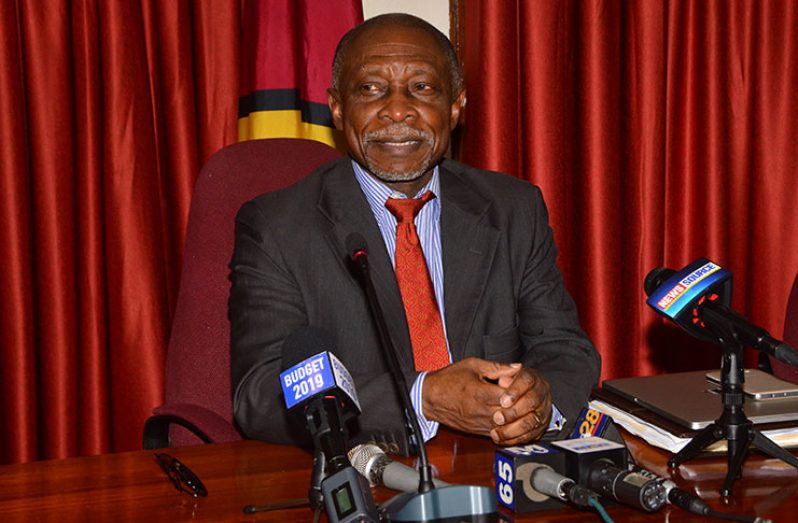–– to defend Guyana’s territory at ICJ
GUYANA has thus far spent approximately US$3.7M or Guy$780M in legal fees to defend its territory against Venezuela at the International Court of Justice (ICJ), Foreign Affairs Minister Carl Greenidge has disclosed.
The US$3.7M is a fraction of the US$18M signing bonus the Guyanese Government had received from U.S. oil giant ExxonMobil in 2016. From the grand total, US$15M was set aside to facilitate the legal matter at the ICJ.
“The US$15M is what is funding the legal fees. It was used to fund all the legal fees in 2018, and it will fund the fees in 2019 until it is exhausted,” the foreign affairs minister said.
He, at the time, was fielding questions from reporters during a press conference at his ministry on Thursday.
Asked if the move to resolve the territorial controversy at the level of the ICJ is costing the Guyanese people “too much,” the foreign affairs minister responded in the negative while emphasising that it is an investment that protects the territorial rights of Guyanese.
The foreign affairs minister reasoned that with an estimated five billion oil-equivalent barrels of recoverable resource in the Stabroek Block, Guyana by 2021 would be raking in much more than US$15M.
“Five billion barrels will probably generate at the beginning of 2021, over US$350M per annum. Now, how much is the amount we are fretting over, that’s a once and for all investment in protecting your rights, $15M. What is it we are arguing about?” the minister reasoned.
He also used the settlement of the Guyana-Suriname maritime boundary controversy at the United Nations Tribunal on the Law of the Sea as a case in point.
“If for example, we had lost the Suriname case… If Suriname had prevailed, if the line running from the mouth of the Corentyne River was more towards Suriname side… all of Liza 1 (in the Stabroek Block) would have been Suriname’s property.
So unlike the Guyanese, Suriname would have been celebrating even now, and not trying to commit suicide,” he explained.
The previous administration – the People’s Progressive Party/Civic (PPP/C) had spent US$10M to settle the dispute with Suriname.
WORTHY AND NECESSARY
“You spend US$10M and one of the wells – Liza 1 is 86 kilometers from the border, and if that border had been further west, which was what Suriname was insisting on, all of that would have been Suriname’s property,” Minister Greenidge further explained as he insisted that resolving the territorial controversy with Venezuela is worthy and necessary.
The foreign affairs minister noted too that Venezuela’s decision or action over the next four months will determine how the ICJ will treat with the case, and whether there will be need for an expanded legal team. Venezuela has up to April to submit a memorial addressing the question of the jurisdiction of the ICJ to hear the longstanding border controversy.
The minister explained that even if Venezuela maintains its position not to participate in the process, Guyana’s legal team will still be answerable to the court.
“I think that one has to be careful in these circumstances because if the judge finds he is only hearing from one side, he wants to appear to be fair and may even ask you harder questions than the other side because he knows what he wants to satisfy himself. So other teams may be required or the team may need to be supplemented by additional lawyers or firms of lawyers,” Minister Greenidge explained.
Guyana submitted its Memorial on Jurisdiction in the case brought against Venezuela on November 19, 2018.
The country in its submission to the ICJ argued that Venezuela’s contention that the means of settlement outlined in Article 33 of the UN Charter must be exhausted before recourse to the court can be chosen is baseless.
“Guyana’s Memorial shows there is no foundation to Venezuela’s contention that the means of settlement listed in Article 33 of the UN Charter must be selected by the Secretary-General successively, such that the means listed ahead of judicial settlement have to be exhausted before recourse to the court can be chosen,” the foreign affairs minister had told the National Assembly last month.
Guyana maintained that nothing in the text of Article IV of the Geneva Agreement, which provides a menu of options, supports Venezuela’s interpretation.




.png)









